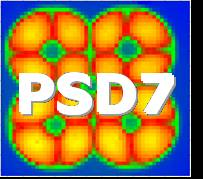Speaker
Dr
Junko Kohagura
(Plasma Research Centre, University of Tsukuba)
Description
Tomographic reconstructions of X-ray emission from hot electrons
having a temperature of several tens of keV have been carried out by
the use of the novel position-sensitive X-ray semiconductor detector
array. The X-ray detection system in the thermal-barrier region of
the GAMMA 10 tandem-mirror plasmas consists of a 48-channel silicon
semiconductor detector array.
X-ray energy responses of the new detector array along with response
uniformity of detector channels have been characterized by using
synchrotron radiation at the Photon Factory of High Energy
Accelerator Research Organization (KEK) in Japan. The X-ray
reconstructed signals under standard thermal-barrier operational
conditions indicate a good axisymmetric radial profile peaked on the
magnetic axis. When we make outward shifts of the second-harmonic
electron cyclotron layers radially by intensifying the mirror
magnetic fields in the thermal-barrier region, tomographically
reconstructed signals show hollow X-ray profiles. Several
applications including investigations of these hot electrons due to
the second-harmonic electron-cyclotron heatings are made with the
novel position-sensitive X-ray semiconductor-detector array. For
instance, essential investigations in relation to an internal
transport barrier and intermittent turbulent vortex-like structures
are carried out for the purpose of physics studies of universal
effects of radially sheared electric fields on plasma-confinement
improvements.
Primary author
T Numakura
(Plasma Research Centre, University of Tsukuba)
Co-author
Dr
Junko Kohagura
(Plasma Research Centre, University of Tsukuba)
